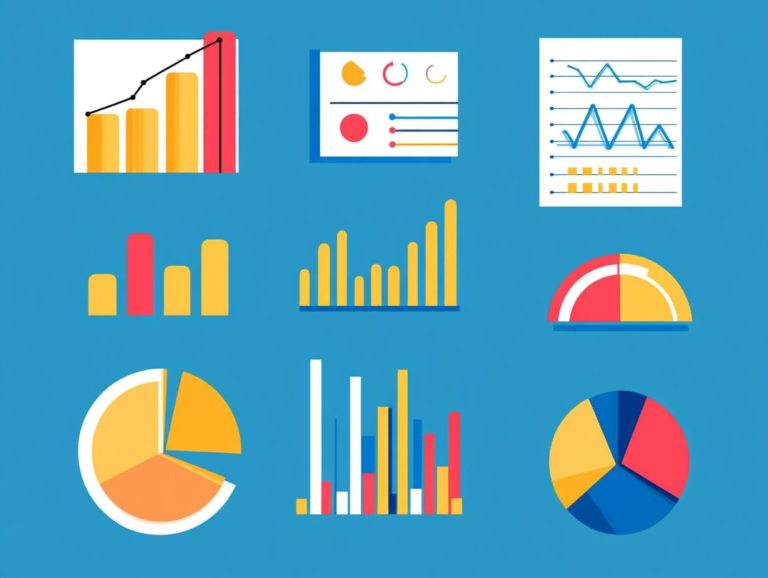using analytics to drive project decisions
In today’s fast-paced project management world, using analytics is not just beneficial; it is vital for making smart decisions and streamlining your processes.
This article delves into what analytics encompasses and its pivotal role in project management, emphasizing the benefits of harnessing data to boost efficiency and pinpoint potential roadblocks.
You will explore essential analytics tools, practical steps for implementation, and best practices to maximize their impact. We will also explore emerging trends that are shaping the future of analytics in project management.
Discover how leveraging data can revolutionize your projects!
Contents
- Key Takeaways:
- Benefits of Using Analytics in Project Decisions
- Key Analytics Tools for Project Management
- Implementing Analytics in Project Management
- Maximizing the Impact of Analytics on Project Decisions
- Challenges and Limitations of Analytics in Project Management
- Future of Analytics in Project Management
- Frequently Asked Questions
Key Takeaways:

Analytics can help project managers make informed decisions and increase efficiency. Key analytics tools, such as data visualization and predictive modeling, can identify and address potential project roadblocks. Incorporating analytics into project processes and utilizing best practices can maximize the impact of data-driven decisions.
What is Analytics and Why is it Important in Project Management?
Analytics is all about the structured analysis of data, and it is essential for project management. It gives you the power to make data-driven decisions that truly enhance project outcomes.
By leveraging data analysis techniques, you can extract actionable insights that improve performance metrics, optimize resource allocation, and drive business success with informed strategies.
The significance of analytics is immense. It equips you to navigate complex project landscapes with confidence. By synthesizing vast amounts of information, you can identify risks and seize opportunities.
This ultimately leads to more efficient timelines and budgets. Embracing analytics cultivates a culture of business intelligence, enabling stakeholders to monitor progress in real-time and adjust plans as needed.
This level of responsiveness can elevate project quality and stakeholder satisfaction. It ensures your team remains aligned with organizational goals while achieving outstanding results that pave the way for future success.
Benefits of Using Analytics in Project Decisions
Leveraging analytics in your project decisions offers a multitude of benefits, including using data analysis for better project insights, that can significantly elevate your overall project success.
By harnessing data, you empower yourself to enhance efficiency, improve communication with team members, and promote continuous improvement through real-time tracking and feedback loops.
This strategic approach not only streamlines your processes but also positions you to make informed decisions that drive impactful results.
Improved Decision-Making and Efficiency
Incorporating analytics into your project management processes can significantly enhance your decision-making and efficiency. This allows you to make informed choices based on data insights and key performance indicators that truly reflect your team s performance.
By leveraging these analytical tools, you can pinpoint potential bottlenecks in your workflows and predict project outcomes with remarkable accuracy.
Take, for instance, a software development team that utilized analytics to monitor their sprint cycles. By examining completion rates against their established KPIs, they discovered they were consistently falling short on certain features.
This revelation enabled them to adjust resource allocation and refine their processes, ultimately resulting in faster project delivery times and greater client satisfaction.
As this example illustrates, analytics not only gives you the power to optimize your team s performance, but also cultivates a culture of transparency and accountability that propels project success.
Act now to discover how leveraging data can revolutionize your projects!
Identifying and Addressing Project Roadblocks
Analytics acts as a powerful ally in your quest to identify and address project roadblocks. By using data analysis methods, you can pinpoint inefficiencies and risks that threaten to compromise your project outcomes.
Through the systematic analysis of historical data and current trends, you can uncover valuable insights into potential bottlenecks that might not be immediately obvious. This proactive approach to risk assessment is essential for fostering an environment that promotes strategic planning and knowledge-based decision-making.
By utilizing important measurements for success (KPIs) and predictive analytics, you can anticipate challenges before they escalate into significant issues. Planning for different outcomes and contingency planning empower you to devise actionable solutions, ensuring your team remains agile and responsive to emerging challenges.
Ultimately, harnessing these data-driven insights not only enhances the success of your projects but also nurtures a culture of continuous improvement.
Key Analytics Tools for Project Management

You have access to a variety of sophisticated analytics tools designed to enhance project management. Among these are business intelligence (BI) tools and project tracking platforms like ActiveCollab.
These tools not only facilitate data visualization but also deliver essential performance metrics, empowering you to make informed decisions with confidence.
Overview of Popular Analytics Tools
Several popular analytics tools, including ActiveCollab, Bitband, and Google Analytics, offer comprehensive solutions tailored for project managers who aim to elevate their project tracking and data visualization capabilities.
These tools come packed with features that streamline your workflow management, making it a breeze to monitor progress and analyze performance metrics.
For example, ActiveCollab empowers you to visualize project timelines and resource allocation, helping ensure your team stays on course. Bitband, on the other hand, hones in on real-time data analytics, allowing you to make informed decisions swiftly.
Then there’s Google Analytics, which truly shines when it comes to tracking traffic and user engagement. It provides essential insights that can help you refine your strategies.
Harness these capabilities now to enhance collaboration, improve reporting accuracy, and ultimately drive your projects toward successful outcomes.
Implementing Analytics in Project Management
Implementing analytics in your project management demands a strategic approach. It involves meticulous data collection, identifying process efficiencies, and conducting user testing to guarantee that real-time tracking and actionable insights are utilized effectively.
Adopting this method enhances decision-making and drives project success.
Steps for Incorporating Analytics into Project Processes
To successfully weave analytics into your project processes, begin by establishing clear reporting features and feedback loops that enhance data quality and promote continuous improvement. This foundational step grants you real-time insights, allowing you to make informed decisions based on precise data.
Next, identify key performance indicators (KPIs) that align with your project goals. This creates a roadmap for measuring success. Regularly collecting and analyzing relevant data not only deepens your understanding but also illuminates areas ripe for optimization.
Engaging all stakeholders in this process fosters collaboration and boosts accountability.
Ultimately, your aim is to leverage analytics as a strategic tool that drives efficiency, mitigates risks, and propels your projects toward successful outcomes.
Maximizing the Impact of Analytics on Project Decisions
To maximize the impact of analytics on your project decisions, you need to adopt a series of best practices that ensure you fully leverage data-driven insights.
By doing so, you ll enhance project outcomes and overall effectiveness, transforming raw data into actionable strategies that drive success.
Start implementing analytics in your projects today to unlock their full potential!
Best Practices for Utilizing Analytics Effectively

To utilize analytics effectively in project management, adopt strategies like quantitative risk assessment. This will help inform your decision-making processes.
By integrating these practices, you can identify potential pitfalls early in the project cycle. This allows you to develop proactive strategies to mitigate risks before they escalate.
This approach promotes making decisions based on data. With solid numerical insights, you can navigate complexities with greater confidence.
Enhancing the accuracy of your risk assessments enables you to allocate resources more efficiently. You can prioritize tasks with a clear understanding of their potential impacts.
Ultimately, by harnessing these analytics techniques, you pave the way for more successful project outcomes.
Challenges and Limitations of Analytics in Project Management
While the advantages of analytics in project management are abundant, you might face challenges. These include the risk of data overload and the necessity for skilled personnel.
Maintaining high data quality is critical to deriving meaningful insights. Addressing these challenges is essential for success.
Potential Obstacles and How to Overcome Them
Various obstacles can impede your effective use of analytics in project management. Inadequate resource allocation and a lack of user engagement are common issues.
Recognizing that insufficient funding can hinder the analysis process allows you to prioritize your budget. Ensure you have the right tools and trained staff in place.
Fostering an environment that encourages user participation leads to richer data collection and better insights. Implement regular training sessions and create feedback loops to promote engagement.
By adopting these approaches, your project management team can effectively harness analytical tools. This results in enhanced decision-making and overall project success.
Future of Analytics in Project Management
The future of analytics in project management is on the brink of transformation. Emerging trends and technologies like predictive forecasting will redefine how you approach data-driven decision-making.
Embracing these advancements gives you the power to make more informed choices. This will steer your projects toward success.
Emerging Trends and Technologies
Emerging trends and technologies, especially in analytics and data visualization, are poised to transform your project management approach. They equip you with sophisticated tools for interpreting data.
These advancements allow you to track progress with greater precision. You can identify potential bottlenecks before they turn into major roadblocks.
By utilizing interactive dashboards and real-time analytics, you can visualize complex data sets. This makes it easier to extract actionable insights.
This enhanced clarity gives you the power to make informed decisions. You can ensure your project goals are achieved on time and within budget.
As these technologies continue to evolve, their integration into your project workflows will likely promote greater collaboration. This drives efficiency and innovation across your team.
Frequently Asked Questions

What is the importance of using analytics to drive project decisions?
Using analytics allows project managers to make data-driven decisions. This can lead to more accurate and successful project outcomes.
Analytics helps identify trends, patterns, and potential risks. This enables better planning and resource allocation.
What types of data can be used for analytics in project decisions?
There are various types of data that can be used. Examples include historical project data, financial data, customer feedback, market trends, and social media data.
The type of data used will depend on the specific project and its objectives.
Unlock Project Success with Analytics!
Analytics gives clear insights into project progress. Project managers can track key performance indicators (KPIs) and spot potential issues early.
This helps improve project efficiency and keeps it on track.
Overcoming Challenges in Analytics!
Common challenges include gathering and organizing large data sets. Ensuring data accuracy and effectively communicating findings to stakeholders is also crucial.
Having a solid plan helps tackle these challenges.
Make Smart Decisions with Analytics!
Project managers should understand their goals and what data matters for measuring progress. The right tools are essential for collecting, analyzing, and interpreting this data.
Discover the Benefits of Analytics for Your Projects!
Analytics leads to better project outcomes and boosts efficiency. It also aids in resource allocation and accurate forecasting.
It helps identify risks and opportunities, enabling more informed decisions.






